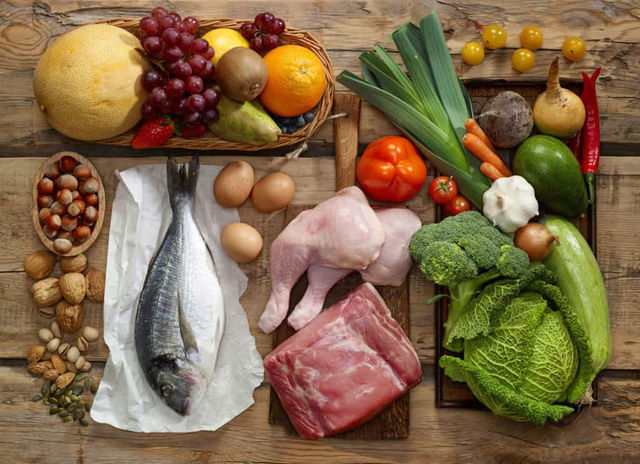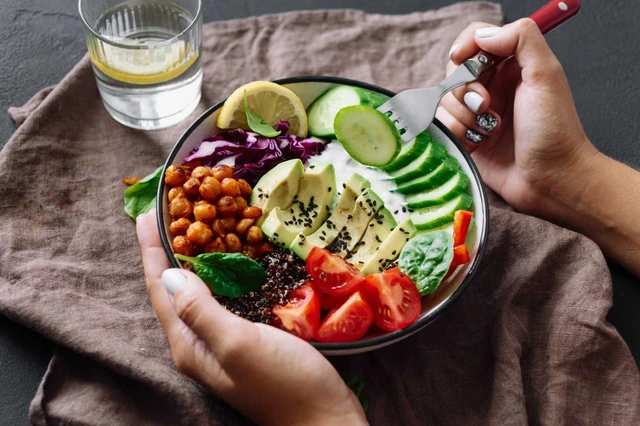‘Clean eating’ means choosing foods that are as close to their natural state as possible instead of eating a lot of processed foods. It is not a strict diet but a long-term lifestyle that supports overall health and weight control.
1. What is “clean eating”?
Clean eating is an increasingly popular lifestyle, especially for those who want to lose weight, due to its beneficial effects on health. According to an analysis by the Harvard T.H. Chan School of Public Health (USA), in general, clean eating is said to refer to food that is as close to its natural state as possible, such as organic, and uses a minimum of any chemical additives and preservatives.
A clean diet includes whole fruits, vegetables, lean proteins, whole grains, and healthy fats, while limiting highly processed snacks and other packaged foods with added sugar and salt.
A survey by the International Food Information Council (IFIC) helps to better define consumer beliefs about clean eating. People who “eat clean” were found to eat foods that are not highly processed, such as fresh or organic fruits and vegetables, as well as food products with short, simple ingredient lists.
Nearly half of those surveyed who considered themselves “clean eaters” cited eating foods that were not highly processed, eating fresh produce, eating organic foods, and eating foods with simple ingredient lists as the most common. 64% of those surveyed said they try to choose foods that are made from clean ingredients, foods that are “non-artificial or synthetic,” “organic,” “fresh,” or “natural.”
However, “clean eating” is an unregulated term, so interpretations of what defines clean eating can vary widely, both among individuals and within the food industry that markets “clean” products. Going too “clean” can increase the risk of eating disorders.

Clean food is healthy food.
2. How does “clean eating” help you lose weight?
According to nutritionists, following a diet that prioritizes healthy, nutrient-rich foods will help you stay healthy and maintain a healthy weight.
Foods that help maintain the healthiest weight include lean protein, whole grains, fresh vegetables and fruits, healthy fats, etc. It not only provides a lot of nutrients but also reduces refined carbs, additives such as salt, sugar and bad fats, while helping to cut down on daily calories.
In fact, eating clean properly based on these healthy foods can have major benefits for weight loss by:
Regulating appetite and cravings: By choosing whole, nutrient-dense foods, eating clean can help regulate appetite and cravings, making it easier to stick to a healthy eating plan.
Providing sustained energy: Eating more foods without processed or added sugars can help provide sustained energy throughout the day. Foods with added sugars or sugars can cause spikes and crashes in blood sugar.
Supporting healthy digestion: Eating clean supports healthy digestion by providing a variety of high-fiber foods such as fruits, vegetables, nuts and seeds, and whole grains.
Improve nutrient intake: Clean eating can improve nutrient intake by providing a variety of whole, unprocessed foods that are rich in essential vitamins and minerals needed by the body.

“Eating clean” the right way is good for health and weight loss.
3. Foods in the “clean eating” diet help lose weight healthily
- Lean protein: Chicken, lean beef, pork tenderloin, lamb, eggs, fish, tofu, tempeh, beans (lentils, green beans) …
- Dairy products: Milk, yogurt, kefir (try to choose pure products, low in sugar).
- Non-starchy vegetables: Leafy greens, spinach, kale, lettuce, broccoli, bell peppers, tomatoes, zucchini, cauliflower, mushrooms, asparagus, onions, leeks, carrots, beets, celery, fennel, okra, artichokes, watercress…
- Fruits: Berries (strawberries, raspberries, blueberries), apples, pears, oranges, tangerines, bananas, watermelon, cantaloupe, kiwi , papaya , pineapple, peaches, plums, apricots…
- Gluten-free grains: Quinoa, brown rice, oats, rice noodles, corn noodles, cornmeal…
- Healthy fats: avocado, nuts (almonds, cashews, chia seeds, flax seeds, pumpkin seeds, sunflower seeds, sesame seeds, pine nuts), olive oil, coconut oil, avocado oil, sesame oil…
- Herbs and spices: Basil, parsley, rosemary, marjoram, dill, chili powder, cinnamon, turmeric, ginger, garlic powder, onion powder, pepper…
- Beverages: Purified water, coffee, unsweetened almond milk, unsweetened soy milk, green tea, herbal tea…





